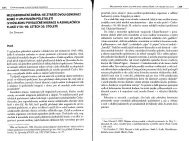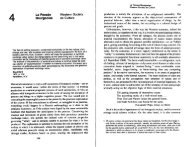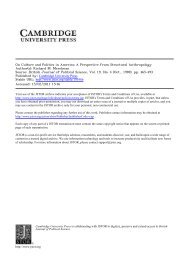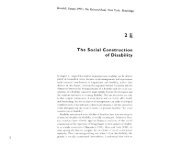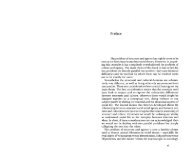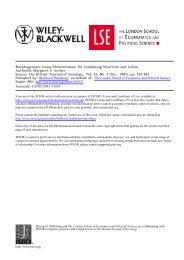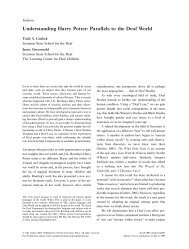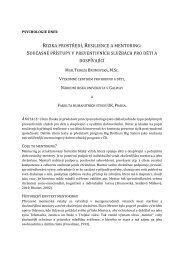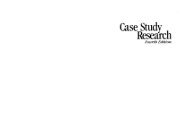Culture and Practical Reason Two Paradigms of ... - Moodle
Culture and Practical Reason Two Paradigms of ... - Moodle
Culture and Practical Reason Two Paradigms of ... - Moodle
- No tags were found...
You also want an ePaper? Increase the reach of your titles
YUMPU automatically turns print PDFs into web optimized ePapers that Google loves.
Chapter <strong>Two</strong> 108 <strong>Culture</strong> <strong>and</strong> <strong>Practical</strong> <strong>Reason</strong><strong>Two</strong> <strong>Paradigms</strong> <strong>of</strong> Anthropological Theory109as the external object <strong>of</strong> human manipulation or to trade it <strong>of</strong>f for the solereality <strong>of</strong> the intentional subject. How then Radcliffe-Brown? Surely thesame considerations would prevent Durkheim from indulging in the thinlydisguised utilitarianism <strong>of</strong> a sociological functionalism. Not even his enthusiasmfor "solidarity" ever permitted him to suppose in principle thatthe function <strong>of</strong> a custom, or its role in the satisfaction <strong>of</strong> the besoinssociaux. could provide an account <strong>of</strong> its specific nature. 38 Nevertheless,the lineaments <strong>of</strong> Radcliffe-Brown's functionalism show forth in Durkheim'sontology. Negating the political economy, Durkheim was forced toreproduce at the level <strong>of</strong> society, viewed as a kind <strong>of</strong> supersubject, thesame economism he refused as constituting at the level <strong>of</strong> the individual.One can follow this union <strong>of</strong> opposites very well in an early paper (1887)on German moral science, where Durkheim champions the social perspectives<strong>of</strong> the economic historians G. Schmoller <strong>and</strong> A. Wagner against theliberals <strong>of</strong> the "Manchester school." For the latter, Durkheim writes,political economy consists <strong>of</strong> the satisfaction <strong>of</strong> the needs <strong>of</strong> the individual<strong>and</strong> especially <strong>of</strong> his material needs. In this conception, theindividual thus exists as the unique end <strong>of</strong> economic relations; by him<strong>and</strong> for him everything is done. As for society, it is a figment <strong>of</strong>thought, a metaphysical entity that the scholar can <strong>and</strong> must ignore.What goes by that name is only the collection <strong>of</strong> all individual activities;it is a whole no greater than the sum <strong>of</strong> its parts.... One seesthat basically the liberal economists are unknowing disciples <strong>of</strong> Rousseau,whom they mistakenly repudiate. True, they recognize that thestate <strong>of</strong> isolation is not ideal, but like Rousseau they see nothing in thesocial tie but a superficial rapprochement, determined by the conjunction<strong>of</strong> individual interests. [Durkheim 1887, p. 37. But see his lateressay (1965) on Rousseau for a changed opinion.]But then, the argument against the individual being is exactly the existence<strong>of</strong> a social being-<strong>and</strong> against the ordering power <strong>of</strong> individual need, it isthe social need. The denial that a given practice, for example, economic,stems from individual desire takes the form <strong>of</strong> an insistence on its socialutility:For [Wagner <strong>and</strong> Schmoller], on the contrary, society is a true being,without doubt nothing outside the individuals who compose it, but38. "To show in what respect a fact is useful is not to explain why it is true nor why it is whatit is. For the uses it serves presuppose the specific properties which characterize it, but donot create it. The need we have <strong>of</strong>things cannot determine that they be such <strong>and</strong> such <strong>and</strong>,by consequence, it is not this need that can take them out <strong>of</strong> nothing <strong>and</strong> give themexistence" (Durkheim 195(») [18951, p. 90; d. pp. 94-95,109-11; <strong>and</strong> 1965. pp.42-44).which nevertheless has its own nature <strong>and</strong> personality. These expressions<strong>of</strong>the current tongue-collective consciousness, collective mind,the body <strong>of</strong> the nation""':'do not have a mere verbal value but expressfacts that are eminently concrete. It is wrong to say that the whole isequal to the sum <strong>of</strong> its parts. By the simple fact that the parts havedefinite relations with each other, are arranged in a certain way, somethingnew results from the assemblage: a composite being, surely, butone with special properties <strong>and</strong> which may even under special circumstancesbecome conscious <strong>of</strong> itself. ... As ... the social being hasneeds <strong>of</strong> its own <strong>and</strong> among them the need <strong>of</strong> material things, it institutes<strong>and</strong> organizes in order to satisfy these needs an economic activitywhich is not that <strong>of</strong> this or that individual or that <strong>of</strong> the majority <strong>of</strong> thecitizens, but <strong>of</strong> the nation in its entirety. [Ibid., pp. 37-38]Society thus has its own ends, which are not those <strong>of</strong> the individual, <strong>and</strong>it is by the first, not the second, that social activity may be understood. "Inorder for a fact to be sociological, it must interest not only all the individualstaken separately, but the society itself. The army, industry, the familyhave social functions inasmuch as they have as their objective the one todefend, the other to nourish society, the third to assure its renewal <strong>and</strong>continuity. " (Durkheim 1886, p. 66) In the event, the utilitarian teleologycould not be avoided. The whole means-ends paradigm was built into theconception <strong>of</strong> the social fact, inasmuch as this fact was determined byopposition to individual need. Only now, the life <strong>of</strong>society, was the relevantfinality. But, in addition, precisely as it had been defined as exterior<strong>and</strong> by contradistinction to individual welfare, this idea <strong>of</strong> social survivalhad a number <strong>of</strong> permanent effects on the idea <strong>of</strong> the social object. Onewas the view that society was continuously menaced from within by a war<strong>of</strong>each against all <strong>and</strong> was constructed to avoid that danger: a concept thatpr<strong>of</strong>oundly inspired many <strong>of</strong> the works <strong>of</strong> the Annt?e Sociologique group,as it also stood behind Radcliffe-Brown's concern for "coaptation" <strong>and</strong>the jural order generally (cf. Sahlins 1972, chap. 4). It may be that thisnotion <strong>of</strong> subterranean strife <strong>and</strong> the functional problems it presents tosociety remain the most important legacy bestowed on social science bycapitalist ideology. More obviously, the emphasis on the life <strong>of</strong> society asopposed to individual purpose provided logical rationale for the appropriation<strong>of</strong> the entire organic metaphor as the basic idea <strong>of</strong> social constitution.The tradition <strong>of</strong> society as an organism was <strong>of</strong> course maintained byRadcliffe-Brown, <strong>and</strong> with it the division <strong>of</strong> social anthropology or sociologyinto the life-science branches <strong>of</strong> morphology, physiology, <strong>and</strong> evolution.It required only the proposition that the "social function" <strong>of</strong> aninstitution, or its contribution to social continuity, is also its "raison



